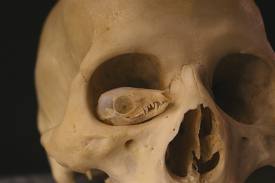Government Grants
Business Grants
Home Owner Programs
Federal Programs
About Us
Population and Evolutionary Processes
The Population and Evolutionary Processes Cluster supports research on population properties that lead to variation within and among populations and among species.
Approaches include empirical and theoretical studies of microevolution, organismal adaptation, geographical differentiation, natural hybridization and speciation, as well as processes that lead to macroevolutionary patterns of trait evolution.
Please note that studies focusing on interactions among species should be directed to the Ecological Biology Cluster.The Population and Evolutionary Processes Cluster funds projects within the Population and Evolutionary Processes Program as well as CAREER, OPUS and LTREB.
Other relevant funding opportunities are listed below as well as on DEB Home (see link on left).
The Population and Evolutionary Processes Program supports studies of the demography of age- and stage-structured populations and of changes in populations, using analytic, stochastic, or statistical approaches.
It supports evolutionary ecological studies of single species including:
life history and life cycle phenomena of terrestrial, freshwater, and wetland organisms; patterns of natural and sexual selection; causes and consequences of reproductive isolation; phylogeography; and single-lineage phyletic evolution.
Within evolutionary genetics, it supports studies of population and quantitative genetics and studies of how micro- and macro-evolutionary processes, including epigenetics and development, explain the evolution of complex phenotypes.
It supports molecular population biology studies of the causes and consequences of variation, change, selection, and evolution of biochemical characteristics, RNA and DNA sequences and mobile elements; how the properties of genes (number, arrangement, and pattern) and their interactions determine evolutionary processes; the evolution of genetic architecture; and evolutionary genomics.
Unsolicited proposals should be prepared as described in the Grant Proposal Guide (GPG).Inter- and multi-disciplinary proposals that fall across traditional programmatic boundaries are welcomed and encouraged.
The Population and Evolutionary Processes cluster has a long history of co-reviewing such proposals with other NSF programs.
Studies focusing on organism-centered analyses of physiology, morphology, behavior, or development should be directed to programs in the Division of Integrative Organismal Biology (IOB).
Studies of the population ecology of marine organisms should be directed to the Biological Oceanography Program in the Division of Ocean Sciences
Approaches include empirical and theoretical studies of microevolution, organismal adaptation, geographical differentiation, natural hybridization and speciation, as well as processes that lead to macroevolutionary patterns of trait evolution.
Please note that studies focusing on interactions among species should be directed to the Ecological Biology Cluster.The Population and Evolutionary Processes Cluster funds projects within the Population and Evolutionary Processes Program as well as CAREER, OPUS and LTREB.
Other relevant funding opportunities are listed below as well as on DEB Home (see link on left).
The Population and Evolutionary Processes Program supports studies of the demography of age- and stage-structured populations and of changes in populations, using analytic, stochastic, or statistical approaches.
It supports evolutionary ecological studies of single species including:
life history and life cycle phenomena of terrestrial, freshwater, and wetland organisms; patterns of natural and sexual selection; causes and consequences of reproductive isolation; phylogeography; and single-lineage phyletic evolution.
Within evolutionary genetics, it supports studies of population and quantitative genetics and studies of how micro- and macro-evolutionary processes, including epigenetics and development, explain the evolution of complex phenotypes.
It supports molecular population biology studies of the causes and consequences of variation, change, selection, and evolution of biochemical characteristics, RNA and DNA sequences and mobile elements; how the properties of genes (number, arrangement, and pattern) and their interactions determine evolutionary processes; the evolution of genetic architecture; and evolutionary genomics.
Unsolicited proposals should be prepared as described in the Grant Proposal Guide (GPG).Inter- and multi-disciplinary proposals that fall across traditional programmatic boundaries are welcomed and encouraged.
The Population and Evolutionary Processes cluster has a long history of co-reviewing such proposals with other NSF programs.
Studies focusing on organism-centered analyses of physiology, morphology, behavior, or development should be directed to programs in the Division of Integrative Organismal Biology (IOB).
Studies of the population ecology of marine organisms should be directed to the Biological Oceanography Program in the Division of Ocean Sciences
Obtain Full Opportunity Text:
NSF Program Description
Additional Information of Eligibility:
Not Available
Full Opportunity Web Address:
http://www.nsf.gov/funding/pgm_summ.jsp?pims_id=12824
Contact:
If you have any problems linking to this funding announcement, please contact
Agency Email Description:
NSF grants.gov support
Agency Email:
grantsgovsupport@nsf.gov
Date Posted:
2006-08-15
Application Due Date:
2012-07-17
Archive Date:
2009-05-27
Social Entrepreneurship
Spotlight
The U.S. Government on Cultivating Impact Investing And Social Enterprise

According to a Private Capital, Public Good report recently released at the White House from a group of A-list impact investing and social enterprise specialists, the U.S. government can do a lot to spur the growth among the impact investing and social enterprise sectors.

